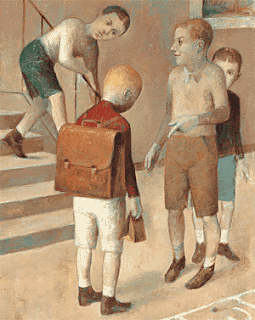Rethinking Bullying V
 What advice can we bestow upon a young person who is suffering at the hands of a bully? How can we, as adult leaders, help adolescents in situations such as these? How did Odysseus handle his terrifying experience in the cave of the Cyclops? In order to address the issue of bullying, we must first examine what effects bullying has on the spirit of the young person.
What advice can we bestow upon a young person who is suffering at the hands of a bully? How can we, as adult leaders, help adolescents in situations such as these? How did Odysseus handle his terrifying experience in the cave of the Cyclops? In order to address the issue of bullying, we must first examine what effects bullying has on the spirit of the young person. There is an interesting dynamic at work in situations like these. Young people (and, being honest, we adult leaders, too) sometimes find themselves acting out of fear (i.e., avoiding situations similar to the ones in which the bullying took place) in an effort to escape further bullying. For example, a student who enjoys playing soccer might choose not try out for the team if someone who has bullied or harassed him is also trying out. To the victim, this sounds like a reasonable plan, but looking at the results through the lens of the heart, we come to understand that self-limiting actions such as these have a wilting effect on the spirit. Acting out of fear leads to more fear rather than less. How can we assist young people who are being bullied to make decisions not out of fear, but rather out of strength?
There is an interesting dynamic at work in situations like these. Young people (and, being honest, we adult leaders, too) sometimes find themselves acting out of fear (i.e., avoiding situations similar to the ones in which the bullying took place) in an effort to escape further bullying. For example, a student who enjoys playing soccer might choose not try out for the team if someone who has bullied or harassed him is also trying out. To the victim, this sounds like a reasonable plan, but looking at the results through the lens of the heart, we come to understand that self-limiting actions such as these have a wilting effect on the spirit. Acting out of fear leads to more fear rather than less. How can we assist young people who are being bullied to make decisions not out of fear, but rather out of strength?Labels: adolescents, adult responsibility, behavior, bully, bullying, defeat, insidious, intervention, popular, power, privacy, shyness, spiritual, target, tormenting, victim



















